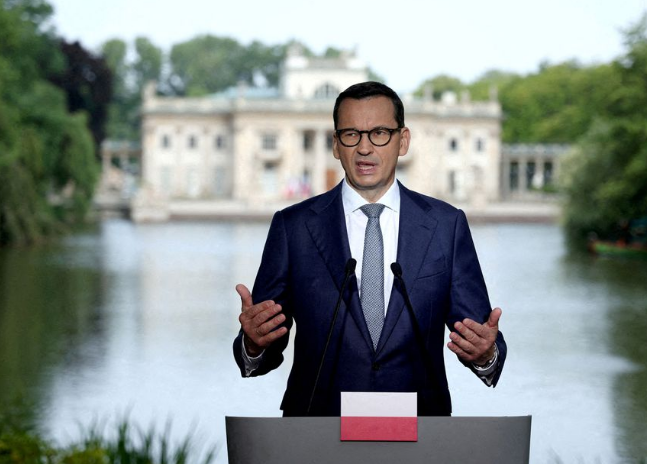Poland has affirmed that it is fulfilling previously established arms deliveries to Ukraine, according to a government spokesperson. This declaration comes amidst a downturn in bilateral relations triggered by a grain dispute, a development that coincides with Poland’s upcoming parliamentary election.
The recent decision by Poland to extend a ban on Ukrainian grain imports has irritated Kyiv. Until recently, Poland was viewed as one of Ukraine’s staunchest allies in its ongoing conflict with Russia.
Prime Minister Mateusz Morawiecki’s announcement on Wednesday that Poland, a NATO member, would no longer be supplying arms to Ukraine further exacerbated tensions. Instead, Poland would concentrate on replenishing its stockpile of weaponry.
Government spokesman Piotr Muller clarified Poland’s position, stating, “I would like to inform you that Poland is only carrying out previously agreed supplies of ammunition and armaments. This includes those resulting from the contracts signed with Ukraine.”
In response to Morawiecki’s comments on arms supplies, State Assets Minister Jacek Sasin added, “At the moment, it is as the prime minister said, in the future, we will see.” Sasin emphasized that the grain import dispute did not signify a withdrawal of Polish support for Ukraine in its conflict with Russia. Rather, Poland was addressing the necessity of rebuilding its arsenal to ensure national security.
“In this case, Polish interests come first,” Sasin stressed. “We cannot disarm the Polish army, we cannot get rid of the weapons that are necessary for our security.”
Poland has provided Ukraine with various weapons, including T-72 and Leopard tanks, armoured vehicles, and howitzers since the onset of the Russian invasion on February 24, 2022. However, a complete list of all the materials supplied has not been published.
In response to these developments, Ukraine’s ambassador to Poland sought to ease tensions, asserting that no one in Ukraine had an interest in causing problems for Polish farmers. He expressed optimism that a resolution to the grain dispute could be reached.
Furthermore, Ukraine’s farm minister engaged in a phone call with his Polish counterpart, agreeing to work towards a solution that serves the interests of both countries, according to the Ukrainian agriculture ministry.
Amidst these diplomatic fluctuations, a U.S. official, speaking anonymously, dismissed the notion that Morawiecki’s comments represented a substantial rift in Western solidarity with Ukraine. The official stressed that despite occasional tensions, Poland remained committed to supporting Ukraine.
Poland is scheduled to hold a parliamentary election on October 15, with the ruling nationalist Law and Justice (PiS) party facing criticism from the far right for its perceived pro-Ukraine stance. The Confederation party, which has articulated anti-Ukrainian sentiments, is currently polling third in many surveys and could potentially hold sway in the election. Analysts suggest that PiS’s tougher rhetoric on Ukraine may be an attempt to secure more support among the anti-Ukrainian electorate in Poland.








 India
India












